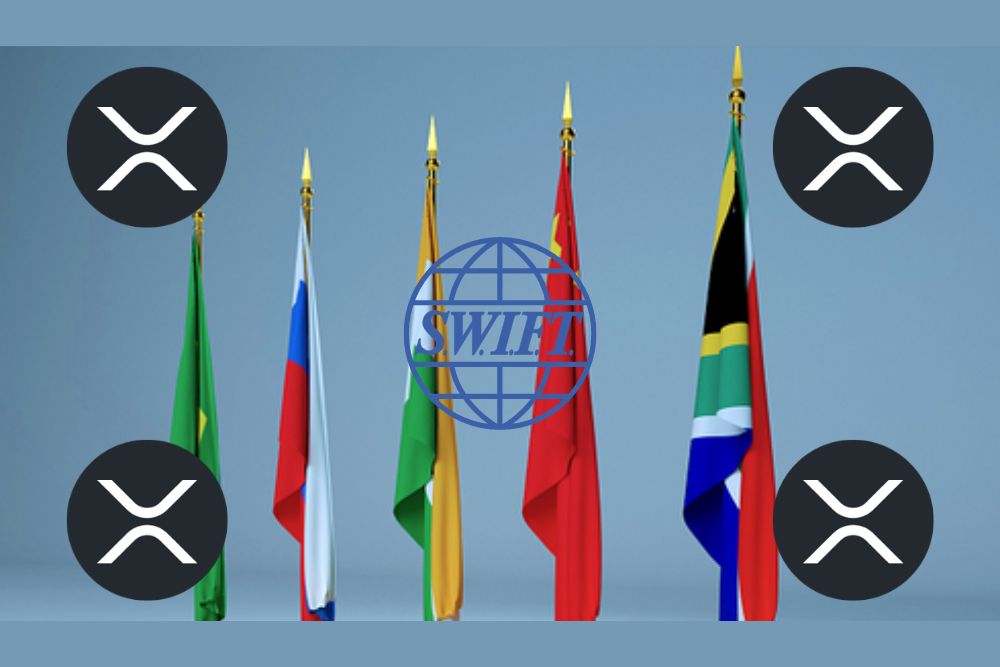

The recent announcement of the BRICS alliance’s intention to develop a financial messaging system to replace SWIFT marks a significant development in the global financial landscape. This move, aimed at reducing reliance on the US dollar, has far-reaching implications for the international monetary system.
Central to the BRICS initiative is the pursuit of financial autonomy. By establishing an alternative to SWIFT, the bloc seeks to bypass the Western-dominated financial infrastructure and facilitate trade and investment among its members using local currencies. This strategy aligns with broader efforts to de-dollarize the global economy.
Concurrently, the cryptocurrency market has witnessed growing speculation regarding the potential role of XRP in the emerging BRICS financial ecosystem. Amelie (@_Crypto_Barbie), a prominent voice in the XRP community shared the news, excited about the potential impact on XRP and the role the digital asset can play in the BRICS payment system.
Ripple, the company behind XRP, has cultivated a robust network of partners within the BRICS nations that leverage its technology for cross-border payments. This existing foothold within the BRICS bloc positions XRP as a potential candidate for integration into the new BRICS payment system.
Thailand, a prospective BRICS member, has expressed interest in adopting XRP, further cementing the digital asset’s relevance to the region. If XRP were to be adopted by the BRICS bloc, it could potentially revolutionize cross-border transactions within the group, offering speed, efficiency, and cost-effectiveness compared to traditional SWIFT-based systems.
Market analysts suggest that XRP capturing even a modest 10% of SWIFT’s transaction volume could propel its price to $1,000. Such a scenario would be underpinned by the massive scale of the BRICS economies and the potential for XRP to become a core component of their financial infrastructure.
The technical feasibility of integrating XRP into a complex, multi-currency system, regulatory considerations in different jurisdictions, and the competitive landscape within the cryptocurrency market are among the key challenges that must be addressed.
However, Ripple has built the foundation for the next phase of global finance, and the BRICS alliance, being a favorable government to blockchain technology and cryptocurrencies, can easily develop the required regulatory frameworks.
The BRICS alliance’s pursuit of a SWIFT-like financial system presents a transformative opportunity for the global economy. The potential role of XRP in this new financial system could change the world, and the crypto world is eager to see this become a reality.
Disclaimer: This content is meant to inform and should not be considered financial advice. The views expressed in this article may include the author’s personal opinions and do not represent Times Tabloid’s opinion. Readers are urged to do in-depth research before making any investment decisions. Any action taken by the reader is strictly at their own risk. Times Tabloid is not responsible for any financial losses.
Follow us on Twitter, Facebook, Telegram, and Google News
In a market brimming with anticipation, Pi Network (PI) is once again in the spotlight.…
Ever felt like you missed the boat on the last big meme coin? With the…
Analysis reveals that ADA token supporters face an unpleasant fact because research dismisses the possibility…
Crypto Eri (@sentosumosaba), a respected figure in the cryptocurrency community, recently highlighted concerns regarding CME…
American entrepreneur Patrick Bet-David has recently sparked new interest in XRP’s potential to disrupt traditional…
Ripple’s CEO, Brad Garlinghouse, has expressed enthusiasm about the upcoming launch of XRP futures on…